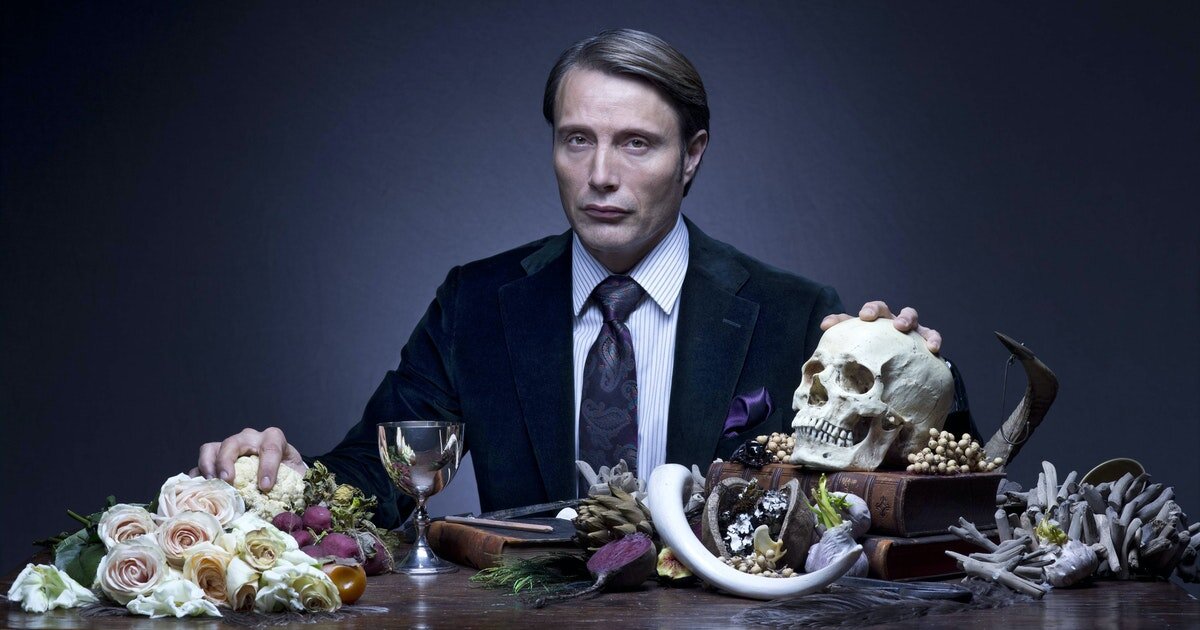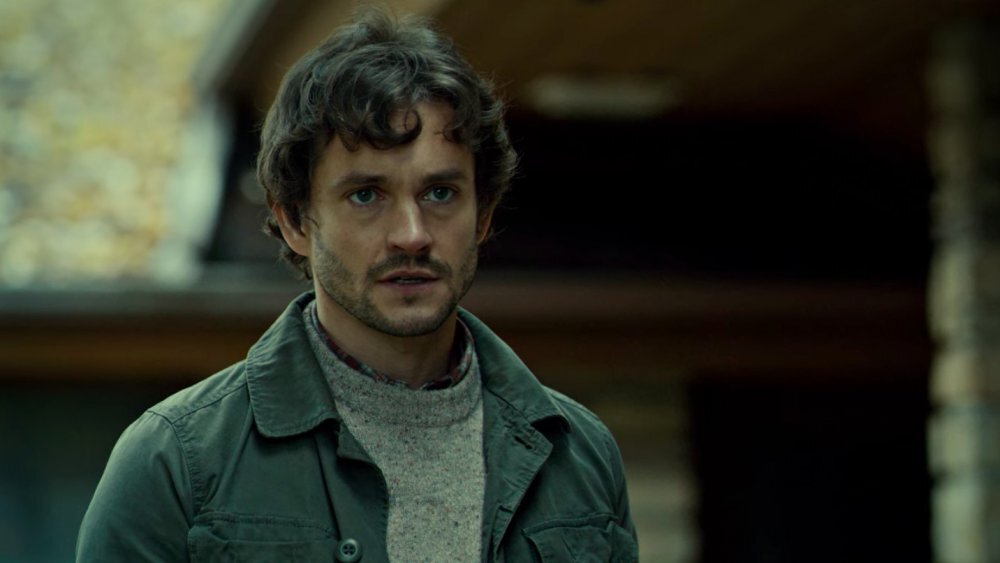[TV Review] Hannibal - Season One (2013)
Allowing the macabre to hold such beauty and wonder feels morally wrong, by giving murder such aesthetic strengths that cause the viewer to feel passionately positive about the horrific acts on screen feels wrong, but Hannibal proves that death, depravity and disgust can be a majestically beautiful piece of work.
The imagining of the character, Dr. Hannibal Lecter, was first conceived by author Thomas Harris who in 1981 wrote a novel entitled Red Dragon. This introduced horror fans and avid readers to a world in which a sickening serial killer with cannibalistic tendencies could also be beholden to his exemplary taste in expensive wines, classical music and fine dining while also working closely with the FBI to provide psychiatric insights and support. It was this concept of taking a traditionally depraved psychotic villain and turning them into something that was peculiarly admirable, that led to a flurry of film adaptations - with the first being Michael Mann’s 1986 film Manhunter.
Yet adaptations didn’t stop there, with Jonathan Demme’s 1991 The Silence of the Lambs becoming the most notable and commended adaptation of the book, due to its focus on a strong female lead in the form of Clarice Starling, played by Jodie Foster, and her devilish counterpart Dr. Hannibal Lecter, played by Anthony Hopkins. Even though some would argue that the 1991 film is the most perfect example of bringing Lecter to the screen, more films were spawned and the audience’s obsession with the central cannibal character continued for many years. Perhaps this is why in 2013 NBC decided to let Bryan Fuller take this disturbing concept and translate it into a TV series, further embodying the audience into a world of flesh and fine taste.
In the TV adaptation we go back to Harris’ original storyline with FBI special investigator Will Graham,(Hugh Dancy), coming out of his retirement. As well as continuing to lecture and teach, Will also provides counsel and offers his unique perspective to Jack Crawford, (Laurence Fishbourne), and his murder investigation unit. Due to Will’s psychic tendencies the nature of the work leads to problems with his mental health and stability. To combat this, a Psychiatrist is brought into the act as a sounding board for Will during these difficult moments. However, said psychiatrist happens to be Dr. Hannibal Lecter, played by Mads Mikkelsen. Although Will, Jack and everyone around them are unsuspecting of Lecter’s true nature, the audience watches through tainted vision as we are already privy to the fact that this doctor also happens to be one of the most prolific serial killers imaginable.
As we are introduced to the characters we begin to see them for who they really are - each one is portrayed with their flaws worn on their sleeve, which allows the viewer to easily become immersed in this world. With Will as our protagonist, we are allowed to see through the eyes of a damaged man, showing that not all main characters are perfect, something that often seems to be the case for many popular shows and films. The first three episodes quickly establish rapport between the audience and the show, building out a wealth of cast that will be carried through the majority of all three seasons. We also are greeted pleasantly with the stunning aesthetics of Hannibal, something which became one of the show’s most notable features. Even though the subject matter of every episode is disturbing and gruesome, it is displayed with beauty pageantry, causing a conflict in the viewer between being enamoured with how exquisite every slither of flesh looks and the horrific reality of depraved murders and dinners made from human body parts. Horror has always depicted an act such as cannibalism as dirty, with some certain films like Marian Dora’s Cannibal (2006) leaving the viewer needing to take multiple showers, but Hannibal does the opposite of this concept and instead presents the viewer with such intense artistry that it is difficult to look away even when the scene on screen is of a woman impaled upon the antlers of a deer.
Hannibal approaches real-life horror with a certain amount of delicacy and sensitivity, in episode 5 ‘Coquilles’ we learn that Jack Crawford’s wife, Bella, has an aggressive and untreatable form of cancer, and that she is also having an affair. This information is disclosed to Dr. Lecter during a therapy session and although he might be a maniac, he provides her with comfort and reassurance that she has to do what feels right for her in a time of distress and fear. When Jack finally finds out the truth about his wife’s disease, they discuss the topic like adults staring the cold hard truth in the face; although distressing and bleak, death is approached in a realistic manner here, not romanticising or fantasising any aspects of it.
As we head towards episode 9, we begin to understand the loss and sense of time and the tangible alongside Will. The show does a remarkable job when it comes to pacing and setting; it constantly provides so much depth and information in one episode that it feels difficult to put into perspective the timings in which scenarios happen in the show, which allows the viewer to feel as confused and disillusioned as Will does. Every episode we see an unfathomable amount of murders, and at first it feels like there are far too many serial killers but this alludes to the fact that in reality months and years may have passed, but we are never given this knowledge - just like how Will cannot tell when it has been a minute versus a week. This chaotic effect means that for both the viewer and Will, the only constant grounding point throughout the show is Dr. Lecter, which is an extremely dangerous and unreliable source to anchor to.
By the time we come to the end of the season we have been fully transported to a world where Dr. Lecter controls everything and everyone around him with ease, class and perfection. Mads Mikkelsen exudes the personality crafted by Thomas Harris, and naturally carries the air of sophistication, seduction and sinister secrets. Hugh Dancy is an exemplary counterpart, coming across as a resonating human that we can both identify with and empathise for. Hannibal delves into darker themes as the show progresses and begins to serve every episode with the same attention to detail that Dr. Lecter puts into his extravagant meals crafted of prime humans. Once you’ve tasted even a morsel of the relationship between Will and Hannibal, gazed upon the beauty of gory aesthetics and succumbed to the psychotic energy on screen, there is something so deliciously macabre and intriguing about the entire show.




























![[Film Review] Mercy Falls (2023)](https://images.squarespace-cdn.com/content/v1/5fe76a518d20536a3fbd7246/1695482997293-E97CW9IABZHT2CPWAJRP/Screenshot+2023-09-23+at+16.27.27.png)
![[Film Review] V/H/S/85 (2023)](https://images.squarespace-cdn.com/content/v1/5fe76a518d20536a3fbd7246/1697455043249-K64FG0QFAFVOMFHFSECM/MV5BMDVkYmNlNDMtNGQwMS00OThjLTlhZjctZWQ5MzFkZWQxNjY3XkEyXkFqcGdeQXVyMTUzMTg2ODkz._V1_.jpg)
![[Film Review] Shaky Shivers (2022)](https://images.squarespace-cdn.com/content/v1/5fe76a518d20536a3fbd7246/1696442594997-XMJSOKZ9G63TBO8QW47O/Screenshot+2023-10-04+at+18.59.33.png)
![[Film Review] A Wounded Fawn (2022)](https://images.squarespace-cdn.com/content/v1/5fe76a518d20536a3fbd7246/1695484054446-7R9YKPA0L5ZBHJH4M8BL/Screenshot+2023-09-23+at+16.42.24.png)
![[Film Review] Elevator Game (2023)](https://images.squarespace-cdn.com/content/v1/5fe76a518d20536a3fbd7246/1696440997551-MEV0YZSC7A7GW4UXM5FT/Screenshot+2023-10-04+at+18.31.42.png)
![[Film Review] Perpetrator (2023)](https://images.squarespace-cdn.com/content/v1/5fe76a518d20536a3fbd7246/1695483561785-VT1MZOMRR7Z1HJODF6H0/Screenshot+2023-09-23+at+16.32.55.png)
![[Film Review] Kill Your Lover (2023)](https://images.squarespace-cdn.com/content/v1/5fe76a518d20536a3fbd7246/1697465940337-T55VQJWAN4CHHJMXLK32/56_PAIGE_GILMOUR_DAKOTA_HALLWAY_CONFRONTATION.png)
![[Film Review] Sympathy for the Devil (2023)](https://images.squarespace-cdn.com/content/v1/5fe76a518d20536a3fbd7246/1697186986143-QDVLQZH6517LLST682T8/Screenshot+2023-10-13+at+09.48.52.png)

![[TV Review] Junji Ito Maniac: Japanese Tales of the Macabre (2023)](https://images.squarespace-cdn.com/content/v1/5fe76a518d20536a3fbd7246/1675626891240-UYL6BTD1GV9I3UEUQPZG/image2.jpg)
![[TV Review] Dead Set (2008)](https://images.squarespace-cdn.com/content/v1/5fe76a518d20536a3fbd7246/1664787670655-G8UTH9HDQCNBIE6K9WA2/Screenshot+2022-10-03+at+09.58.28.png)
![[TV Review] Buffy The Vampire Slayer (1997- 2003)](https://images.squarespace-cdn.com/content/v1/5fe76a518d20536a3fbd7246/1664172852528-QN3YQI0K5M7OHWXY1EKR/buffy.jpeg)
![[TV Review] The Chilling Adventures of Sabrina (2018-2020)](https://images.squarespace-cdn.com/content/v1/5fe76a518d20536a3fbd7246/1664172038833-EBYFI7STZ97CMI13AR99/SABRINA2.jpeg)
![[TV Review] Supernatural (2005-2020)](https://images.squarespace-cdn.com/content/v1/5fe76a518d20536a3fbd7246/1655573865841-QLDABX1BTQD62WL5171W/Image%2B1%2B%25284%2529.jpg)
![[TV Review] Scream TV Series (2014) Season 1](https://images.squarespace-cdn.com/content/v1/5fe76a518d20536a3fbd7246/1655656570649-S2516JEUBDALYLSRZT04/Screen-shot-2015-06-30-at-6.55.43-PM.png)
![[TV Review] Marianne (2019)](https://images.squarespace-cdn.com/content/v1/5fe76a518d20536a3fbd7246/1642852814142-Q7N595RY5ECXF1XKRC34/marianne+top.jpeg)
![[TV Review] Boris Karloff: The Man Behind the Monster (2021)](https://images.squarespace-cdn.com/content/v1/5fe76a518d20536a3fbd7246/1644088673462-SM7VB9ORKL7LFYE3RLGA/Image+1+%283%29.jpg)
![[TV Review] The Boulet Brothers’ Dragula Season 4](https://images.squarespace-cdn.com/content/v1/5fe76a518d20536a3fbd7246/1640260117973-N8H35J9LC5TBNV8SUFBU/Image+1+%283%29.png)
![[TV Review] Behind The Monsters (2021)](https://images.squarespace-cdn.com/content/v1/5fe76a518d20536a3fbd7246/1636655798596-NOAWXH9FGRLY4TVXUPSX/Image+1+%285%29.jpg)
